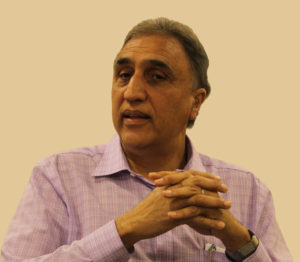Physics was simple, elegant and it offered real explanations but his Christian faith could not compete with it. Read the journey of a Physicist.
 Emmanuel Haqq was born in Punjab, India, and before he turned thirteen, he and his family immigrated to the US. As the oldest son of Dr Akbar Abdul Haqq who was an associate evangelist with Billy Graham, Emmanuel’s family life was built around the Bible and the Gospel. So it comes as no surprise that in their home there were many robust discussions about Scripture and a world of ideas.
Emmanuel Haqq was born in Punjab, India, and before he turned thirteen, he and his family immigrated to the US. As the oldest son of Dr Akbar Abdul Haqq who was an associate evangelist with Billy Graham, Emmanuel’s family life was built around the Bible and the Gospel. So it comes as no surprise that in their home there were many robust discussions about Scripture and a world of ideas.
Haqq was fascinated by physics. He writes, “In my mid-teens, I loved browsing in my father’s library and was especially drawn to the books on physics. When I read about Einstein’s theory of relativity, the pages dense with symbols describing tensors and new geometries, I thought that if I ever mastered these symbols I would know the secrets of the Universe”. It was this fascination for the subject that led him to obtain his post-doctoral degree at the University of Minnesota in Theoretical Physics where he focused on elementary particle physics. Unfortunately for Haqq, it did not unlock the secrets of the Universe.
When he moved to the US, Dr Haqq’s faith was shaken. He writes, “My mother was diagnosed with cancer. We watched her suffer; huddled around the gurney each time the ambulance took her to the hospital and saw the skin tightening around her face as she lost weight”. But he and his family never gave up – “we prayed with faith and hope”. Mighty Church Leaders called in to say they were praying for her. However she soon passed away leaving behind seven children of whom the youngest was only three years old. Haqq was baffled. “I was left confused about a God who would not answer such prayers”. “Was there any explanation? Was there such a God or were we just crying out to the ceiling?” he questioned his faith.
While pursuing his study of physics, Haqq was taken up by the “power and beauty of mathematics and physics”. Describing his learning experience in the university, he writes, “There were times after a lecture that I felt pure joy  welling up inside of me at the wonder of what I had heard. Physics was so simple and elegant, yet it was able to describe, what seemed like, all of reality. It offered real, solid, testable explanations.” Physics seemed so contrary to his Christian Faith which seemed “irrelevant, a relic of a pre-scientific era”, he mused. But as Haqq continued to study physics, the evidence began pointing to something or someone beyond physics. “I began to see how physics, with its powerful and elegant tools, was effective in a narrow slice of reality, but it was a slice which left out most of life. It couldn’t explain our humanity or the existence of moral law. Indeed, it could not even explain itself – in a field where all explanations were to come from matter and energy operating under the laws of physics, it offered no explanation for the existence of these immaterial laws of physics”.
welling up inside of me at the wonder of what I had heard. Physics was so simple and elegant, yet it was able to describe, what seemed like, all of reality. It offered real, solid, testable explanations.” Physics seemed so contrary to his Christian Faith which seemed “irrelevant, a relic of a pre-scientific era”, he mused. But as Haqq continued to study physics, the evidence began pointing to something or someone beyond physics. “I began to see how physics, with its powerful and elegant tools, was effective in a narrow slice of reality, but it was a slice which left out most of life. It couldn’t explain our humanity or the existence of moral law. Indeed, it could not even explain itself – in a field where all explanations were to come from matter and energy operating under the laws of physics, it offered no explanation for the existence of these immaterial laws of physics”.
One of the most frequent questions asked by science students is whether Science and the Bible are at loggerheads. “I don’t think science and the Bible are at loggerheads,” writes Haqq, “there are many brilliant scientists who are also committed Christians”. If a Christian is doing research in science, he needs to ask himself the pertinent question, “Can I do research? Can I ask any question at all and seek answers within nature?” According to Haqq, there are a few Christians who though not necessarily involved in science, advise those facing challenging questions in their research to attribute it to the unknowable mysteries of God. So the paramount question by many a researcher is – “Will my Christian faith paralyze my research?” Haqq’s answer to them is to have humility and live comfortably with tension. He explains, “We have to be humble about our scientific understanding of nature, and also humble about our understanding of the Bible; just as our understanding of nature will change and grow, so our understanding of God’s Word must continue to deepen. That means we must be willing to live with tension – willing to accept that since we are not, nor ever will be, omniscient, we must live in the tension of having incomplete answers to our questions.”
Today Dr Haqq is in the process of completing his book, ‘Whispering Skies: How Science took away the faith of a physicist then gave it back again’. This book is about an argument which nature makes about its creator. It speaks of not only the existence of God but also specific characteristics about God. Haqq shares an example, “Nature says that God is self-revealing – a conclusion I came to in the physics library when I happened upon an article on the equation of motion for light in an arbitrary number of dimensions. I also saw that nature makes the case that the Creator makes new life and beauty out of dissolution and death, which pointed me to the wonder of the cross of Christ.”
As nature made its case, Haqq came back to a faith in Jesus as the Creator incarnate and he also came back to a faith in the Bible as the book He authenticated.

Interviewed by Lynette Johnson, Communications Manager, RZIM Life Focus Society, India.
